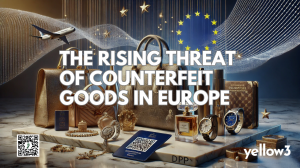The Rising Threat of Counterfeit Goods in Europe and How Digital Product Passports Can Help
Discover how counterfeit goods make up 5.8% of EU imports, costing brands billions. Learn how Yellow3's Digital Product Passport (DPP) combats fake, products
COPENHAGEN, COPENHAGEN, DENMARK, October 17, 2024 /EINPresswire.com/ -- A Yellow3 Research Report
Counterfeit goods are an escalating challenge in Europe, with wide-ranging consequences for brands, consumers, and the overall economy. Counterfeit products account for approximately 5.8% of all EU imports, translating to a staggering €119 billion in economic losses. These fake goods penetrate various industries, from clothing and cosmetics to pharmaceuticals and critical equipment, posing severe risks to financial health and consumer safety.
The sectors most vulnerable to counterfeit activity include clothing and footwear, which suffer annual losses of €12 billion, followed by cosmetics and toys, with losses of €3 billion and €1 billion, respectively.
The impact of counterfeiting is not limited to revenue losses; it also leads to significant job losses, estimated at nearly 200,000 positions across Europe. For brands, the consequences go beyond monetary losses, as counterfeit products erode consumer trust, damage brand reputations, and open up new avenues for organized crime.
Impact on Brands and the Broader Economy
For brands, the damage caused by counterfeit goods extends far beyond financial loss. Counterfeit products often look similar to legitimate ones but need more quality and safety standards than genuine items. This not only results in dissatisfied consumers but also leads to health and safety risks. Brands' reputations can be severely tarnished when consumers associate low-quality counterfeits with legitimate products.
The economic losses from counterfeiting reverberate through the broader economy. Legitimate businesses, from manufacturing to retail, lose out on revenue, resulting in reduced tax contributions and employment opportunities. With nearly 6% of imports into the EU consisting of counterfeit goods, this illegal trade represents a substantial drag on European GDP
The Role of the Digital Product Passport (DPP)
Yellow3's Digital Product Passport (DPP) offers a promising solution to this pervasive issue. The DPP assigns each product a unique digital identity that can be accessed by scanning a code (such as RFID, NFC, or QR), which reveals detailed information about the product's origin, manufacturing process, and journey through the supply chain. This makes it exponentially more difficult for counterfeit goods to pass as legitimate since brands, retailers, enforcement agencies, and consumers can verify every product in real-time.
By providing a transparent and traceable lifecycle for products, the DPP enhances brand protection and aligns with EU sustainability goals. The DPP ensures that products are tracked from cradle to grave, fostering product integrity and environmental responsibility. In addition, the DPP strengthens brand reputations by offering consumers peace of mind when purchasing high-value items like luxury apparel, electronics, and pharmaceuticals.
The Future of Brand Protection
As counterfeit goods threaten legitimate businesses, European brands must adopt innovative tools to protect their products and reputations. Yellow3's DPP is positioned to be a key element in the fight against counterfeiting, providing a robust framework for verifying product authenticity and enhancing consumer trust. The DPP safeguards brands from economic losses and helps ensure a safer and more transparent marketplace for consumers.
In an increasingly digital world, embracing technologies like the DPP will be crucial for brands looking to maintain their integrity and thrive in the European market.
EU Legislation on Digital Product Passports
The European Union has introduced comprehensive regulations as part of its Circular Economy Action Plan, which directly supports the implementation of Digital Product Passports (DPPs). Under the European Green Deal, the Sustainable Products Initiative (SPI) aims to make sustainable products the norm. One of the key regulatory frameworks is the Ecodesign for Sustainable Products Regulation (ESPR), which mandates that a DPP must accompany specific categories of products to provide detailed information about their composition, repairability, and environmental footprint.
The DPP is a critical tool for enhancing product traceability and transparency, aligning with EU objectives to reduce waste and encourage reuse and recycling. This legislation primarily applies to high-impact sectors such as electronics, textiles, and batteries. Still, its scope is expected to broaden as part of the EU's commitment to fostering a more circular economy.
.
Through this legislative push, the EU aims to combat counterfeit goods and environmental degradation by ensuring that all products placed on the market can be tracked throughout their lifecycle. This will empower consumers and businesses alike to make informed, sustainable choices.
Research source:
Thomas Chr Melskens
yellow3, inc
+45 91 98 09 98
email us here
Visit us on social media:
LinkedIn



